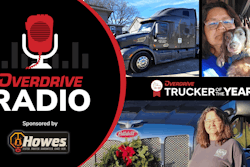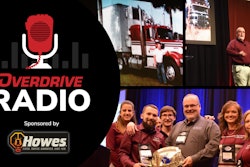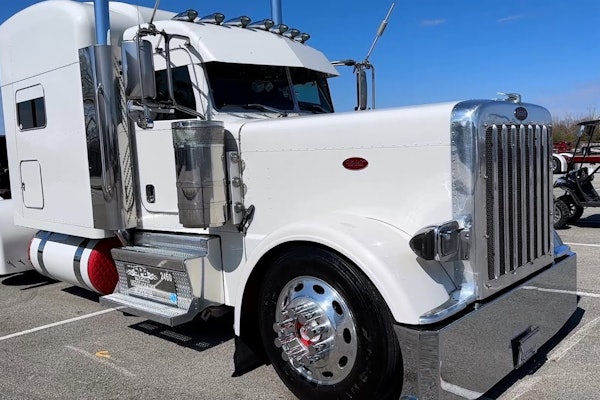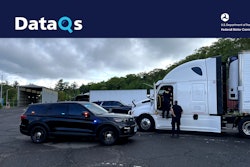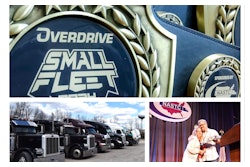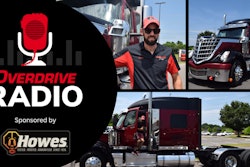Last week we heard Part 1 of a long talk with Gill Freightlines small fleet owner Surinder Gill, with four trucks owned and headquartered out of Manteca, California. Gill’s business follows in the draft of his owner-operator father’s 60-year trucking legacy. (As you can see in the cover image for this week's Part 2 of that talk, the long legacy is honored on the back of Gill Freightlines’ dry vans.) Convoy's quick collapse last Fall nearly spelled out a death sentence for the small fleet, as it was built mostly around dedicated hauling for Convoy's shipper customers.
Gill’s still owed around $35,000 for loads hauled just prior to the collapse, and it soured relationships with a small group of owner-operators with whom he previously worked. The difficulties, in part at least, extend from what he acknowledges as a classic mistake in business.
"I guess it goes back to the age-old saying of 'don't put all your eggs into one basket,'" as he put it.
Yet as detailed in Part 1 of the talk, he proffered the notion that, given how much hauling went unpaid in the Convoy collapse and the company’s tech platform’s quick sale to another brokerage/forwarder, bigger brokerages ought to be required to have larger bonds in place based on the amount of business they do.

In Part 2 today, get a window into what Gill’s doing in the aftermath, pivots he’s making toward more direct business, and his hope that so many shippers’ attitudes toward working with small carriers in their immediate physical vicinity, regardless of size, might change for the better.
[Related: Convoy's unpaid carriers finally settling with Hercules Capital?]
He's got a distribution center he can physically lay eyes on with nothing more than a step out the door to his office, for instance. "I can see them, physically, they can see me physically," he said, "yet where it confuses me is they would rather give work to these kids right out of college who work for [INSERT BIG BROKER NAME HERE] in Chicago or Atlanta or wherever their office is and trust these kids to go vet these carriers who might be carriers or chameleon carriers. ... But they won't give it to me," with just a few trucks. That's even though, of course, Gill's "right down the street."
 Overdrive Radio's sponsor is Howes, longtime provider of fuel treatments like its Howes Diesel Treat anti-gel and Lifeline rescue treatment to get you through the coldest temps, likewise its all-weather Diesel Defender and Howes Multipurpose penetrating oil, among other products.
Overdrive Radio's sponsor is Howes, longtime provider of fuel treatments like its Howes Diesel Treat anti-gel and Lifeline rescue treatment to get you through the coldest temps, likewise its all-weather Diesel Defender and Howes Multipurpose penetrating oil, among other products.
Though load boards and brokers themselves rose out of the need of owner-operators and small carriers to connect to freight they otherwise might not have access to, Gill feels the entire culture around brokerage has devolved with Wolf of Wall Street-type tactics now so dominant that independents become essentially "bottom feeders," he said, in a market like the current one. Volumes have been down in a big post-pandemic readjustment, and demand has sunk back to pre-2020 levels and below, some would say, for an extended period.
Yet he's in it for the long run. He's fully invested in driving change in his own approach to customers. He recognizes his and other independents’ shortcomings, and is committed to being part of a change to re-engage direct customers, really put in the work on building relationships toward better long-term opportunity outside of this or that fancy new brokerage network’s app.
"It's going to drive a change" around trucking, he feels, "and I want to be there for it." Take a listen:
Also mentioned in the podcast: Past Overdrive Small Fleet Champ Jason Cowan's recent talk on building relationships, with customers or otherwise.
Todd Dills: Last week we heard part one of a long talk with Gill Freightlines small fleet owner Surinder Gill, with four trucks owned and headquartered out of Manteca, California, where Gill's following on his owner-operator father's 60-year trucking legacy, honored on the back of Gill Freightlines dry vans. In the wake of the Convoy brokerage's collapse last fall, as noted in last week's podcast, Gill's still yet to be paid for around $35,000 worth of loads hauled pre-collapse, dedicated freight he'd been on for quite a while. He calls it in part a classic mistake on his part.
Surinder Gill: And I guess it goes back to the age-old saying of don't put all your eggs into one basket.
Todd Dills: Classic mistake in some ways, anyway, but systemically, he proffered the notion that given how much freight went unpaid in the Convoy collapse and the company's tech platform's quick sale to another brokerage in forwarder, bigger brokerages ought to be required to have larger bonds in place based on the amount of business they do. That was part one of this two-part edition of Overdrive Radio. I'm Todd Dills, and in part two we're going to get a window into what Gill's doing in the aftermath, pivots he's making toward more direct business, and his hope that too many shippers attitude toward working with small carriers in their immediate physical vicinity might change for the better.
Surinder Gill: I can see them physically, they can see me physically, but yet what confuses me is they would rather give work to these kids out of college who work for Coyote in Chicago or in Atlanta, wherever their office is, and entrust these kids to go vet these carriers who might be carriers or chameleon carriers to haul their product, but they won't give it to me because I have five trucks only and I'm down the street.
Todd Dills: Though load boards and brokers themselves in part rose out of the need of owner-operators and small carriers to connect to freight they otherwise might not have access to, Gill feels the entire culture around brokerage has devolved with Wolf of Wall Street type tactics now so dominant that independents become essentially "bottom feeders" in a market like the current one. Volumes are down post pandemic and demand having sunk back to pre-2020 levels and below, some would say, for an extended period.
Surinder Gill: You'll call on this lane and he'd be like, "Hey, how about this load that's 300 mile round trip? All right. We can only pay you $200." I'm like, "All right dude, good luck." Three hours later it's still sitting on the load board and they've only went up $25. Four hours later, they're still sitting on the load board and they'll be like, "Well my absolute best is 50 more dollars." All right. Now it's 30 minutes to go until the load picks up and then now they'll post it for $900. It's like Jesus.
Todd Dills: Surinder Gill is in it for the long run, though, as noted. Complaints about those sorts of approaches on the boards don't mean he's not fully invested in driving change in his own approach to customers. He recognizes his and other independent shortcomings and is committed to being a part of the change to re-engage direct customers, really put in the work on building relationships toward better long-term opportunity outside of this or that fancy new brokerage network's app.
Surinder Gill: It's going to drive a change and I want to be there for it.
Todd Dills: On the other side of a break, then we'll dive into his post-Convoy moves to sharpen the business. So keep tuned.
Speaker 3: This spring, increase rig power and performance with Howes Diesel Defender. It's warranty safe and made with no alcohol or harmful solvents to keep you running at your best. It provides maximum lubricity and specialized IDX4 detergent cleans and prevents deposits. It safely removes harmful water and even provides a 5% increase in fuel economy or more guaranteed. Grab a bottle today at retailers and truck stops nationwide and visit howesproducts.com for more information.
Todd Dills: Visit H-O-W-E-S, howesproducts.com for much more information about the company's fuel treatments, Howes Multipurpose, and more.
As noted, Surinder Gill's in it for the long haul he said, here describing his own increasing attention to setting up the business for just that in the wake of Convoy's demise.
Surinder Gill: Oh we've fared through. We're not the ones that threw in the towel and said, "All right. We're going to belly up too." Of course not. The people that work with us, they got families to support. We were able to find some new lanes for us, for our guys, and keep them busy. We're talking October. When what's now? April? So it's been six months, right? So six months later we're still doing what we're doing and we added on more equipment. We now took some of the headache that Cotton was taking for us and now it kind of helps me build a smarter and sharper strategy for our company going forward.
How much to put your eggs in a basket with a broker to look at the finances, to look at these quick pay deals because I was one of the carriers that I was like, "Oh, I'm not paying you guys 1%, 2%, 3%. Screw that. I work too hard to negotiate these rates. We're going to keep you in a 30-day cycle. Now I'm more of, "All right. Let me try to get my money from wherever," because I don't trust anybody now. I don't care if you're C.H. Robinson or Knight Logistics or whomever else because this industry, it's become so saturated with double brokering payment issues, PQL, people like that. I read an article I think last year about them holding a carrier's money due to a claim.
Todd Dills: And not just the money for the load where the claim was in question. That article Gill referenced there was one in Overdrive about the cargo claims offsetting contract language brokers often used to reserve the "right" to essentially withhold payment on any carrier's loads to satisfy shipper claims of damage. It's an oft-abused practice. Various players in and around small trucking have been warning carriers to avoid like the plague in their contracts with brokers.
Surinder Gill: So what's to say that it was like $1,000 claim that now he's duped out of his other financials.
Todd Dills: Gill then told another story about several months’ worth of TQL loads he'd not been paid for that turned out were held up within another carrier's factoring company. Turned out it was a case of mistaken identity. TQL was doing some drayage business with a Gill Freightline company out of California. Unlike the Gill Freightlines business.
Surinder Gill: Without an S.
Todd Dills: That carrier's addition of a factoring company, TQL then applied to both carriers with the correct one as the beneficiary. Luckily, after months of waiting and work, the payments for those loads ultimately did arrive, not without plenty in the way of fits and starts and annoyance however.
Surinder Gill: That's why I got so fed up with brokerages over the course of Convoy's collapse that now I don't think twice about quick pay. I'm like, "All right. Let me get my money. At least I know I got something versus nothing." Last week I was like, "I wish the industry does a shakedown where we don't have to rely on brokerages anymore or as much." I do hope shippers are more open to getting work to direct carriers. Who cares if we're a five truck operation? At least you know who we are, we know who you guys are. There's not going to be an issue about identity, about double brokering, stolen freight. If my yard, for example, we're in Manteca, correct?
And right down from our terminal is a Ford factory, it's a plant. I think they ship out parts or whatever the case that they have. I can see them physically, they can see me physically, but yet where it confuses me is they would rather give work to these kids out of college who work for Coyote in Chicago or in Atlanta, wherever their office is, and entrust these kids to go vet these carriers who might be carriers or chameleon carriers to haul their product, but they won't give it to me because I have five trucks only and I'm down the street.
Todd Dills: And you could see them when you walk out at your front door. Yeah.
Surinder Gill: Yes, and they could see us. They could see us literally hauling their product every day. So this whole model, it amazes me that we'd rather do this in distribution than work with people who are right at your front doors. And yes it is some of the carrier's fault. It is our fault. We should go knock on their door every day of the week. What does a brokerage company offer more than a carrier? They offer you 24/7 phone call center support. All right. So let me go find two Filipinos in the Philippines that can work 24 hours. All right. Let me go talk to MacroPoint and say, "Hey, how much would a subscription cost if I needed to track my shipments? Good. Great. Here." It doesn't cost much. So what more does a brokerage offer than a carrier would? Like a larger network, right? Okay. Well don't give the carrier all your guys's freight.
Hey, if I go to Ford and I say, "I want to run your guys's lane from Manteca to Salt Lake City. I see you guys have three loads a week because I get those three loads a week from C.H. Robinson. I would like to be a carrier for that lane." Why can't they divvy it up into lanes? Why does it have to be that Coyote gets everything from? Yes it is easier, right? It's easier to find one brokerage who's branded and who can do this and do that and fancy gizmos. They have everything in the world, but their assets. They have everything in the world. They have these guys who went to college. I didn't go to college, but they have these kids. I'm not that much older, but I'm almost 30 now and I speak to somebody who just got out of college and he's like, "Yeah. I got the load free man and it's paying 120 a mile. Can you take it for us? Can you take it for us?" I feel disrespected.
This numb nut just left college while he was partying at a fraternity. Now he's trying to sell me freight where I'm doing it for a passion. This is my passion. My father's photo is on the back of our equipment. I got drivers with a pregnant wife, drivers with a kid. It's like, "You want to sit here and sell me this baloney? Get out of here." Pisses me off. Irritating.
Todd Dills: I then referenced an edition of Overdrive Radio we ran just a few weeks ago. Veritable sermon 2021 Overdrive Small Fleet Champ Jason Cowan delivered at the Mid-America Trucking Show in March, all about building and maintaining the relationships that will sustain your business. Relationships that is, not just with customers, but that was certainly a big part of it. Find a link to that episode in the show notes for this podcast for April 29th, 2024. Jason Cowan's Silver Creek Transportation grew from one to 10 to 12 trucks without even a single direct written contract, which should present his area of Henderson, Kentucky. How'd he do it? Simply by establishing a personal connection with the traffic managers for those shippers and being their safety valve when other carriers fell through, or brokers that is. Over time, that all led to contracts, to repeat business, and ever greater stability for the fleet, now up in over 30 trucks.
Surinder Gill: With all the analytics out nowadays, and I know there's new carrier setup portal, gohighway.com or go.highway, whatever that's called, and it's really a pain in the ass, first of all. It's ridiculous when you partner with new brokers through Go Highway, they want to have ELD integration. And if you're ELD provider, that's another scam I think this industry is. Not only are you paying your ELD folks for their ELD services, now you got to pay extra if you want to do sharing. First couple of months, I didn't budge. I'm like, "I'm not paying you guys an extra $200 a year just to share my data with a broker." But as more or more of the people that I booked freight with started going to Go Highway, I was like, "All right. It's going to be a problem. I can't close that many doors for myself. We're not that big yet, right? We're still a key component of the load boards."
So we partnered with our ELD, gave them integration, paid them the money, and got all that gizmo done with Go Highway, but now there's all this access. Who's using this data? Somebody's seeing it. Somebody's putting two and two together. So why can't these big, and I'm sure they do, these big facilities, big players like Ford, Del Monte, you name it, Costco, I'm sure whatever region they have their DCs, there should be an analytics of how many carriers are registered in that specific radius. Safer offers everything nowadays. You go on Safer, you could see everybody's everything. You could see a carrier's inspections, what they were put out of service for. So why aren't those analytics being used to source local carriers versus, once again, going to these brokers who are sitting in Illinois or somewhere far away?
I feel like it would be more beneficial to these shippers to use local carriers just because it's ease of business. You're not having to call and go through avenues of people. "Oh. Well let me transfer you to my supervisor. Let me transfer you to that department." No. It should be, "Hey. Hey, Gill Freightlines 0.1 block away from our terminal. Where's your truck at? Oh, yeah. I could see him rolling in. Perfect." That would be nice.
Todd Dills: As long as he doesn't mistake you for the other, the singular Gill Freight Line.
Surinder Gill: Right. Right. Well they're in [inaudible 00:14:13] so they would have a 40-foot container.
That's true, but I was telling Alex.
Todd Dills: Alex Lockie, Gill's talking about there. Overdrive executive editor and the reporter behind much of the coverage of the ongoing fallout from Convoy's collapse.
Surinder Gill: I was telling Alex and my wife, she's in the Air Force and her family's in businesses like gas stations and liquor stores and when I tell them, I don't even vent to them anymore because they're like, "Well what are you still doing in trucking? Leave." It's like, "No. To me it was passion. I did it because my father, to honor him. And I'm not leaving due to some bad apples like Convoy and the way the industry is right now. I want to see a change and I want to be there for it. I don't want to join after the change. I want help make the change." I want Alex to write an article probably 2028 when he finally makes a headline saying, FMCSA or shippers are now using more carriers than brokers. Brokers are shutting down. I want to see that change and I want to be part of it.
I want people like Convoy and their head honchos to actually have to feel that burn we felt and I want to see the Washington DC people who are in DOT and FMCSA, I would love them to drive this change that, "Hey, in the next coming years you want to be a brokerage, you better have five million dollars cash submitted to this bond that if you guys go belly up, you're going to take care of the people that put in the work for you to be this billion-dollar corporation like TQL is or CS Robinson is." We should really hold them like, "Oh, you really want to be a broker? Well then put your money where your brand is." Then you got states like California where, "Oh, it's a clean truck check program. Now you got to go smog your trucks." Jesus. We're paying more every year for these dumb programs and we're not being compensated enough.
When I book a load with, for example, and I'm saying C.H. Robinson, hopefully they don't think I'm talking crap about them. They're actually one of the nicer people that we do work with, but it's like they base their fuel surcharge and it's called a nationwide, but the load I'm doing is California to California. So the nationwide fuel surcharge is probably 22% or whatever because states like New Jersey or New Mexico, for example, is like $3.50 cents for a gallon diesel, but I'm doing a load California to California and I'm having to pay 5.50. So it's like, what the hell? I should have a California fuel surcharge, not a nationwide surcharge. So we're getting nationwide money, but we're subjected to, my gosh, these insane, insane costs.
Todd Dills: Carriers are no doubt smarter than brokers about accounting for operational costs. If you don't have room to negotiate the line haul rate up to account for the inadequacy of a national fuel surcharge on a California load like that, you're most definitely in a bind. That said, many carriers approach surcharges on a regional or even lane by lane basis dynamically. As with tracking and ELD integration and other things Gill's mentioned, the technology exists to know that information with a great amount of certainty week by week by week, as most any conscious owner-operator well knows. Fundamentally, Gill comes back to this.
Surinder Gill: I would like it to be more carrier-centric and I would like it, I think the load board creation or the use of brokers was more created to facilitate owner-operators and one or two truck operators that don't have enough to go to Costco and said, "Give me all your work from point A to point B and I'll cover every single one of them." So I do think it was created for people like us, but now it became something, it's spun off into what it is now. Now it's like we're bottom feeders. Whatever mega carriers can't cover, then it gets sent to mega brokers and mega brokers take their cuts because they're driven like the Wolf of Wall Street people. You follow a script. You'll call on this lane and they'd be like, "Hey, how about this load that 300 mile round trip? All right. We can only pay you $200." I'm like, "All right, dude. Good luck." Three hours later, it's still sitting on the load board and they've only went up $25. Four hours later, they're still sitting on the load board and they'll be like, "Oh, my absolute best is 50 more dollars."
All right. Now it's 30 minutes to go until the load picks up and then now they'll post it for $900. It's like, Jesus. Why do we have to sit there and play these negotiation games and these games of, it's capitalism, right? That's the answer I get from TQL or Coyote when I ask them these questions, be like, "Or you guys could just put your best rate, take your margin, your cut, and actually do put your best foot forward so you're not making people like us go out of business because one day with all these companies closing down, there's not going to be much left. What are you going to do then?"
We've been fortunate to have worked with brokers that are fair and they know who they are and they know us, that if they post a load or they send me an email, I don't even question it. "All right. We'll take it. Thank you for being fair." They clearly made their money and they're passing on. It shouldn't be a trickling down effect, right? It shouldn't be the filtered down coffee. Yeah, there should be a load board for direct shippers to carriers. And I get it. A big distribution center doesn't want to sit there and have a fleet of employees just working on negotiating rates, right? They want to have one bid submitted and have a one-stop shop and leave that headache for somebody else because it creates more overhead for them.
They'd rather have people on forklifts docking and loading versus sitting there and haggling with people like me, right? That's why they offer these lanes to big brokers, but like I said, I guess more of it is created this state of the industry. Yes, the FMC has said they need to do their thing. The Washington DC folks need to revamp some laws, but it does fall a lot on small carriers like us to just keep knocking on the door. That gentleman's example you gave me, very good example. We need to just keep doing that. "Hey here's my number, Mr. supervisor and shipping coordinator. In case C.H. Robinson fails you, I'm the guy down the street. I'll drive over and pick up your load. Let us know." It's a good tactic.
Todd Dills: Be the change, in the end. We've got good examples throughout trucking history of course. Jason Cowan and I'd wager now and into the future, Surinder Gill and his Gill Freightline small fleet. Later to this week, keep an eye out for the opening of the entry period for Overdrive Small Fleet Championship, open to fleets of three to 30 trucks and culminating with a trip for four finalists to Nashville, Tennessee for the conference of program sponsor, the National Association of Small Truck Companies, early November. The ultimate winners are named there and trophies are the vaunted title belts for winners in two categories by a size of the fleet, three to 10 trucks and 11-30 trucks. Find the initial entry form at overdriveonline.com/2024SFC. That's Small Fleet Champ. 2024 capital S-F-C.
Here's a big thanks for listening.






